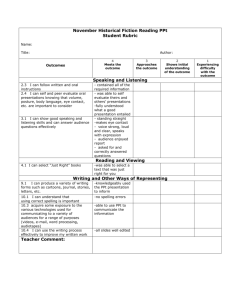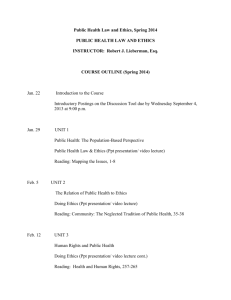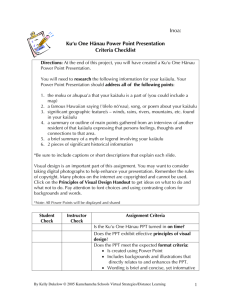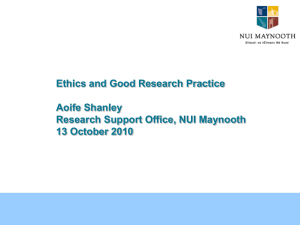RESEARCH ETHICS: In
advertisement
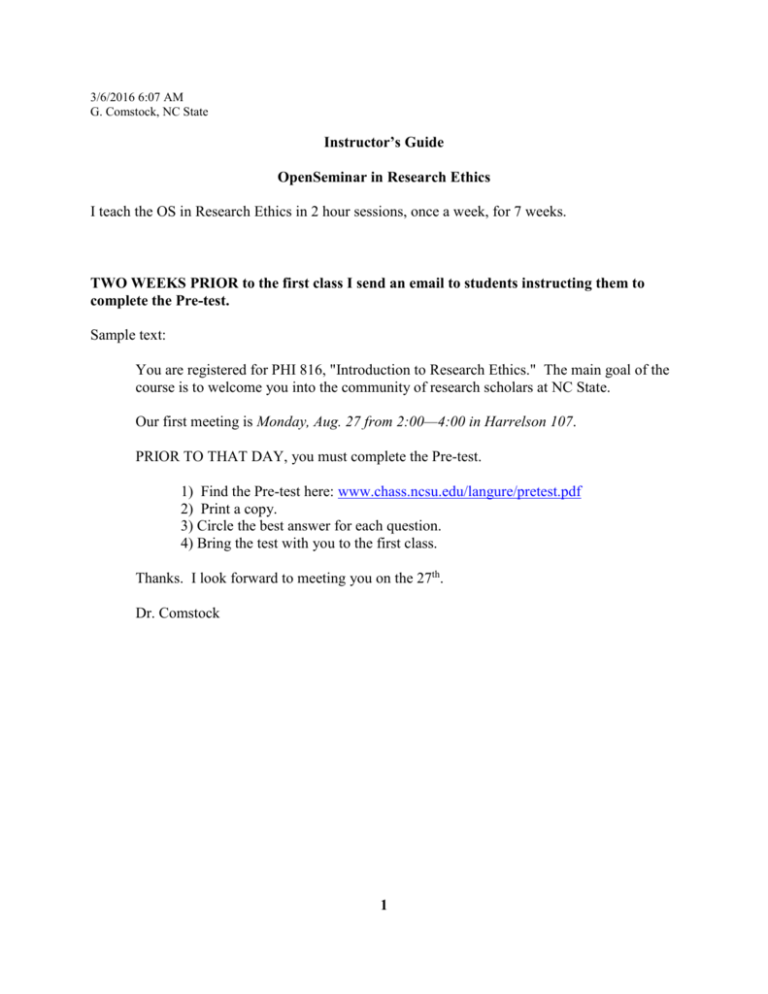
3/6/2016 6:07 AM G. Comstock, NC State Instructor’s Guide OpenSeminar in Research Ethics I teach the OS in Research Ethics in 2 hour sessions, once a week, for 7 weeks. TWO WEEKS PRIOR to the first class I send an email to students instructing them to complete the Pre-test. Sample text: You are registered for PHI 816, "Introduction to Research Ethics." The main goal of the course is to welcome you into the community of research scholars at NC State. Our first meeting is Monday, Aug. 27 from 2:00—4:00 in Harrelson 107. PRIOR TO THAT DAY, you must complete the Pre-test. 1) Find the Pre-test here: www.chass.ncsu.edu/langure/pretest.pdf 2) Print a copy. 3) Circle the best answer for each question. 4) Bring the test with you to the first class. Thanks. I look forward to meeting you on the 27th. Dr. Comstock 1 Hour 1 Goal is to welcome students, help them to feel part of a scholarly community 1. 2. 3. 4. Write outline of day’s activities on board (Syllabus; Introductions; Pre-test; OpenSeminar) Introduce myself (3 min.) Review syllabus (10 min.) Self-introductions (40 min. for 30 students) Go around room state name, department, and a paragraph about your research. If A has previously identified themselves as being in B’s department, I ask B to go sit beside A. The intent is to insure everyone has met at least one person by the end of the class, making good on our promise to do all we can to help them feel part of community, right from the get-go. Two important side-effects: They already have a partner with whom to discuss the pre-test. And, if they take nothing else from the first day, they’ve taken away one acquaintance, preferably someone from their department. 5. Discuss Pre-test with your partner (15 minutes) I do not give out the answers to the Pre-test initially, preferring to engage the students in discussion about them. I assign each team (2 students per team) a number, then instruct each team to determine the answer to the pre-test question corresponding to their team’s number. This works for a class of 50 because there are 25 teams and 25 questions. For a smaller class, say, 26, I assign each team two questions, as follows. After you’ve finished discussing the first question, add 10 to the number of your question, and then determine the answer to that question. For example, the team discussing Pre-test question 1 adds 10, gets 11, and proceeds to discuss question 11; the team discussing question 2 takes question 12 and so on. Allow 10 minutes for teams to discuss their two questions. Allow 15 minutes to call on team 1, discuss their answer, team 2 for their answer, until question 25. If using the additional questions in the field-specific Pre-tests (e.g., Physics, Engineering), I leave sufficient numbers of answer sheets on my desk and instruct those students to pick them up after class. 2 Hour 2 Note: Plan on only having 45 minutes if teaching class in 2-hr sessions 1. Now I provide the answers to the pre-test and we discuss them (30 minutes) 2. Explain how the online readings and quiz questions work on OpenSeminar in Research Ethics (OS). (5 min). 3. Assignment for Hours 3 and 4: Read OS modules 1.0 – 1.4, namely: 1.0 My interests 1.1 Take the long view 1.2 Progress to degree 1.3 Report falsification 1.4 Avoid plagiarism 3 Hour 3 Goals of today’s class: Motivate students, and tackle the“Who cares?” question 1. Today’s assignment: 1.0 My interests 1.1 Take the long view 1.2 Progress to degree 1.3 Report falsification 1.4 Avoid plagiarism 2. On board: 1. Review 2. Intro to Research Ethics 3. Report falsification BREAK 4. Plagiarism 5. My ethical method 3. Review: Last week we 1. Met each other (self-intros) 2. Syllabus (review) 3. Pre-test (review) 4. Openseminar.org (learned to navigate) 4. Intro to research ethics A PPT to guide discussion is here: G. Comstock, 0.0 Intro to course : Opening session (ppt) (35 min.) I take 5 minutes to introduce the Mary Allen story because I find it’s a very effective way to introduce, and answer, the “who cares?” question. 5. Report falsification (10 minutes) OS module 1.3 My Reputation (p. 16 of 28) identifies a half dozen lessons in Mary Allen’s story. Break students into groups of 3. Identify the main 3 lessons you learned from the case. When finished, each group writes one lesson on the board. We then discuss the lessons. 4 Hour 4 Note: Plan on only having 45 minutes if teaching class in 2-hr sessions 1. Plagiarism (30 minutes) - Work through the Plant Biology (or Physics or PA or ECE) online exercise. 2. My ethical method (10 min.) Groups of 3. What considerations do you take into account when making decisions in the areas of research, teaching, writing, mentoring? Write down as many ethical considerations as you can think of. Don’t worry about systematizing them or trying to avoid having contradictory considerations. Sheer quantity wins! You have 5 minutes. After 5 minutes: Which group has most? Read your list. Do other groups have considerations to add? Conclusion: My ethical method: Mirror, Grandma, N&O [last 3 slides of ppt] 3. Assignments for Hours 5 and 6 (5 min.) 1. Print your profession’s code and bring to class. 2. Modules 1.5 - 1.7, and 2.0 – 2.4 1.0 My interests 1.5 Inquire critically 1.6 Strengthen the community 1.7 Egoism’s weaknesses 2.0 Our interests 2.1 Contractarianism 2.2 Professional codes 2.3 Mentoring 2.4 Women and under-represented minorities 5 Hour 5 Goals: Introduce critical inquiry and ethical theory, cover mentoring and URMs 1. Today’s assignment: 1.0 My interests 1.5 Inquire critically 1.6 Strengthen the community 1.7 Egoism’s weaknesses 2.0 Our interests 2.1 Contractarianism 2.2 Professional codes 2.3 Mentoring 2.4 Women and under-represented minorities 2. On board: Today: 1. Review 2. Critical inquiry 3. What is ethics? Egoism and contractarianism 4. Mentoring 5. Women and URMs 3. Review: Last week we covered: 1. Intro to Research Ethics; 2. Report falsification (Mary Allen); 3. Plagiarism; 4. My ethical method 4. Critical inquiry: Research official definition; asking questions; expectation bias; Let’s Make a Deal applet 5. What is ethics? PPT: Module 1.5, G. Comstock, What is ethics? (30 min.) 6. What is a profession? Professional codes (20 minutes) Exercise: Professional codes 1. Find 2 partners. At least one of them preferably not in your department. 2. Find 3 rules that each of your codes share ("common" rules). 3. Write them on the board, or, if the rule is already on the board, place the name of your profession's code next to it. 4. Find 1 rule in your code not shared with your partner's codes. Write it on the board. 5. Discussion question: What is the value of professional codes? (See Varner) 6 Hour 6 1. Mentoring; Women and under-represented minorities PPT: G. Comstock: OpenSeminar Module 2.4 Mentoring women and under-represented minorities in graduate education [PPT] ------Assignments (Hours 7 and 8): 1. Read: 2.6 2.7 2.8 2.9 Authorship and peer review Statistics and experimental design Intellectual property Conflicts of interests; collaborative research 2. Interview your mentor (supervisor, or dept. chair) A hard copy is at the end of this Instructor’s Guide, and here: http://www.chass.ncsu.edu/langure/documents/InterviewPIworksheet.pdf 7 Hour 7 Goals: Cover authorship, use of statistics, IP, and COI 1. On board: Today: 1. Review 2. Authorship 3. Interviews with PIs 3. Statistics 4. IP and COI 2. Review: Last week we covered: 1.5 Inquire critically 1.6 Strengthen the community 1.7 Egoism’s weaknesses 2.1 2.2 2.3 2.4 Contractarianism Professional codes Mentoring Women and under-represented minorities 3. Authorship and peer review (30 min) PPT: G. Comstock: OpenSeminar Module 2.5, Authorship [PPT] 4. Mentor interviews (10 min) 8 Hour 8 1. Statistics (25 min) PPT: G. Comstock: OpenSeminar Module 2.7, Responsible use of statistics [PPT] 2. IP and COI (10 min) ---------3. Assignment for hours 9 and 10: 2.95 Use of humans 3.0 All interests 3.1 Utilitarianism 3.2 Animals 9 Hour 9 1. On board: Human subjects, animal subjects Milgram exercise. See Module 2.95 for instructions Hour 10 2. Human and animal subjects (Comstock, PPT) PPT: G. Comstock: OpenSeminar Module 2.95, Use of animal and human subjects in research [PPT] -------3. Assignment for hours 11 and 12: Read: 3.3 The environment 3.4 Social responsibilities of researchers 3.42 Social mission of universities 10 Hours 11 & 12 1. Discipline-specific seminars. Students meet with faculty in their own departments or inform me of a seminar they will attend on ethical issues specific to their discipline. 2. Readings for hours 11 and 12: 3.3 The environment 3.4 Social responsibilities of researchers 3.42 Social mission of universities 3. Assignment for hours 13 and 14: Read: 3.5 Life-long learning 11 Hour 13 1. Life-long learning PPT: G. Comstock: OpenSeminar Module 2.95, Use of animal and human subjects in research [PPT] Hour 14 2. Course evaluations 12 Rob Streiffer exercises: -------Exercise – Relating Codes to Theories Of what practical use are theoretical considerations in research ethics? Find an example of a rule within your professional code and explain how different theories of ethics would direct us to different considerations in evaluating (either justifying or condemning) that rule. --------Students identify Ethical issues in labs and work environments 1. 2. 3. Divide into small groups of three people. One person should be designated as the notetaker and reporter. From the list, select the one issue that you think is the most common and the one issue that you think is the most serious. Drawing on the readings and class discussions so far, specify precisely what you think those issues are. For one of the two issues, describe two alternative strategies that a lab might adopt to minimize the occurrence of the issue and to respond to it when it occurs. Evaluate those strategies. Ethical issues facing the professions 1. 2. 3. Divide into small groups of three people. One person should be designated as the notetaker and reporter. From the list, select the one issue that you think is the most common and the one issue that you think is the most serious. Drawing on the readings and class discussions so far, specify precisely what you think those issues are. For one of the two issues, describe two alternative strategies that the profession might adopt to minimize the occurrence of the issue and to deal with it when it occurs. Evaluate those strategies. 13 Mentor Interview Working with your departmental partner, pick a research group in your department and interview the leader (or the leader’s designee) about authorship practices and record-keeping. Record your findings and be prepared to discuss them in class. 1. Authorship Practices 1. What criteria does the group use for determining who is an author on a paper? You might want to consider such possible contributions as: overall project design, project funding, design of individual experiments, data collection, data analysis, data interpretation, literature searches and review, writing, editing, and preparation of figures. 2. What criteria does the group use for determining who is FIRST author? 3. What criteria does the group use for determining who is LAST author? 4. What criteria does the group use for determining who receives an acknowledgement? 5. What practices does the group consider "courtesy authorship" and what is the group policy on courtesy authorship? 6. Who in the group has the right to decide authorship? 7. Have relationships ever been strained due to differing views on authorship? If so, without naming the persons involved, what happened? 14 2. Record-keeping 1. What classes of research records are maintained by the group (research notebooks, computer files, films, culture collection lists, etc.)? 2. What are the policies (explicit or assumed) of the group on how research notebooks are to be created and maintained? Include the following information: Any specific type of notebook (bound, loose-leaf, electronic)? If the notebook is bound, is there any particular style that the lab prefers? (If possible, bring an example to class.) Any particular type of writing instrument (ballpoint pen, India ink pen, pencil)? What type of information is to be kept in the notebook (dates, experiment number, title, purpose, approach, methods, protocols, results, data sheets, graphs, computer files, conclusions, suggestions for future experiments, signatures, etc.)? Any policies on how the above information is organized in the notebooks? Any policies on re-writing notes before putting them into a notebook? Who owns the notebooks? Who has access to the notebooks? How long must the notebooks be kept? Who must keep them? Any policies on removal of notebooks from the premises? Any policies on copying the notebooks? 3. Has the group ever suffered because of improperly or inadequately kept notes? [Based on worksheet by Charlotte Bronson, Iowa State University] 15 3. Education in Research Ethics Read this statement to your supervisor: The National Institutes of Health now requires education in responsible conduct of research (RCR) for all graduate students receiving support from NIH training grants. RCR includes the following topics: 1. Data acquisition, management, sharing, and ownership 2. Mentor/trainee responsibilities 3. Publication practices and responsible authorship 4. Peer review 5. Collaborative science 6. Human subjects 7. Research involving animals 8. Research misconduct 9. Conflict of interest and commitment 10. Social responsibilities of researchers 1. How is knowledge of these issues passed on in the lab? Is it mostly informal mentoring relationships? Or are there structured occasions, such as seminars or courses? 2. Is the PI satisfied that colleagues in the department are sufficiently communicating RCR to their graduate students? 3. If the answer to #2 is negative, what more does the PI think the department should be doing? 4. Is the PI aware of PHI 816, “Introduction to Research Ethics?” taught for 1.0 credit, typically on the first seven Monday or Tuesday afternoons of each term? http://www.chass.ncsu.edu/langure/documents/InterviewPIworksheet.pdf 16 Troubleshooting OpenSeminar problems: 1. If you cannot access the server, send an email to John Jernigan at NC State University: jajerni2@unity.ncsu.edu 17
